Society and Societal Work

These free resources are organised into categories aligned to the College of Policing Curriculum and in agreement with police experts. You can study them at any time and anywhere.
Select the duration of study below and you will be taken to resources that match that duration
| An hour or less of study | 1-7 Hours of study | More than 7 hours of study |
|---|
An hour or less of study
1-7 hours of study
More than 7 hours of study
An introduction to social work
Do you want to learn more about the social work role and develop your understanding of some of the theory associated with social work practice? This course begins by introducing key ideas, values, the social work process and the skills needed for social work practice. You will then move on to look at social work with individuals, and finally consider the benefits of reflective practice.
Type of activity: Course
Social problems: Who makes them?
Anti-social behaviour, homelessness, drugs, and mental illness: all problems in today's society. But what makes a problem social? This course will help you to discover how these issues are identified, defined, given meaning and acted upon. You will also look at the conflicts within social science in this area, through examples of inequalities that result from particular social constructions.
Type of activity: Course
Social science and participation
This course looks at how social science investigates participation, and uses this topic to look at how social science helps to enact social worlds. You will see that social science enactment of participation is related to social science descriptions of, for example, voting or other citizenly practices, and related also to social science understandings of, for example, how to define and evaluate poverty.
Type of activity: Course
News
Dr Kendal Wright and Dr Keely Duddin present research on maternity bias and stigma at the IRSPM conference
On 09 April, Kendal Wright and Dr Keely Duddin from the policing team and co-leads on a Parental Pathways research project, presented at the International Research Society for Public Management (IRSPM) conference.
Upcoming Events
Online seminar: Improving retention in police forces through effective support of policing students and recruits
Tuesday, July 15, 2025 - 13:00 to 14:30
